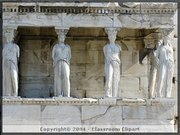Ancient history
|
|

The span of recorded history is roughly 5,000-5,500 years, with cuneiform possibly being the oldest form of writing. Genetic evidence, however, points to the first appearance of human beings about 150,000 years ago. There is also a growing body of evidence that Homo sapiens first left Africa about 60,000 years ago.
| Contents |
The most prominent civilisations of the Ancient Era:
- Ancient China
- Ancient Persia
- Ancient Egypt
- Ancient Greece
- Ancient Rome
- Ancient India
- African Ancient Kingdoms: Axumite Kingdom, Kush, etc.
- Assyria
- Babylonia
- Byzantines (Early Eastern Roman Empire, until 476 BC)
- Hellenic civilization (Greeks)
- Hittites
- Indus Valley civilization, unified from 2600 BC - 1900 BC.
- History of ancient Israel and Judah
- Kingdom of Israel
- Kingdom of Judah
- Mesopotamia
- Mitanni
- Native America
- Roman Empire
- Sumeria
- Susa
- Urartu -- Kingdom from 860 BC to 585 BC
What is written ancient history?
Ancient history is remote, selective, ill-documented, and bias. Of the 142 books of Livy's History of Rome only 35 survive. Ancient history's written records are the product of human memory. The memory of things said and done. The recorded memory is not confused with the event itself by the critical modern historian. In the ancient world miracle, sorcery, demons, Gods, supernatural, etc. are taken for granted and are real to the majority of people. To question the reality of the supernatural, in the ancient world, would make you look irrational or even insane. In the ancient world historians copy from each other, epitome, without footnotes and not always recording their sources. Without the primary source we have no idea whether the copy is correct or has been edited. Independent research and the questioning of early writers and their primary sources are rare. Personal interviews and the use of interrogation techniques to determine "what really happened or why" are basically non-existent. The more data that is discovered can make the memory of the ancient past more confusing. For example, if I have one version of an event and nothing else, it is more comforting than if I have four different versions of the same event. If I have duplicate data this does not make an event true. One of the great fallacies of ancient history is "the closer the event is to the time of its recording the truer it becomes". This fails to take human creativity, hearsay and the notorious fallacy of eye-witness testimony into account. The goal of the modern ancient historian is objectivity. There is usually an educational guess, based on the interpretation of surviving physical evidence, about the "reason" events occured, not what happened.
The modern novice to ancient history has a tendency to come to satisfying conclusions, fill in the blanks, and create convictions too quickly, without using the proper caution that comes from experience and an acceptance of the unknown. There is a preference for a complete story. As always, the present generation assumes they have a more accurate picture of ancient events than the past generation. Critical modern professional historians are aware that they cannot examine the records of the past without any preconceived ideas which will effect their perception, inference and translation of ancient texts. The novice has yet to learn this. (Becker 1931, Loftus 1996, Thomas & Wick 1993, MacMullen 1990, Dodds 1964, Thorndike 1923, MacMullen 1966) Note: This is not new original research. This is old stuff to the professional ancient historian.
Chronology
Beginning of ancient history
- 10,000 BC - invention of agriculture is the earliest given date for the beginning of Ancient Era
- 3,300 - oldest historical documents
- 5,000
- 4,000
Important events
- 3300 BC - Bronze Age begins in the Near East, slowly spreads to the rest of Eurasia
- 2000 BC - Domestication of the horse
- 356 BC - Birth of Alexander the Great
- 323 BC - Death of Alexander the Great
- 149 BC-146 - Third and final Punic War
- 100 BC - Julius Caesar is born.
- 49 BC - Civil War between Caesar and Pompey the Great.
- 313 AD - Edict of Milan declared that the Roman Empire would be neutral toward religious worship
- 378- Battle of Adrianople, Roman army is defeated by the Germanic tribes
- 395- Roman Emperor Theodosius I outlaws all pagan religions in favor of Christianity
- 410- Alaric sacks Rome for the first time since 390 BC
- 476- Prompted by the barbarian General Odacer, the last Roman Emperor Romulus Augustulus abdicates, formally ending the Western Roman Empire.
End of ancient history in Europe
The exact date era of ancient history ends is still disputed among historians. Most common dates are:
- 293 - reforms of Roman Emperor Diocletian, the earliest given date for the end of Ancient Era
- 395 - the division of Roman Empire into the Western Roman Empire and Eastern Roman Empire
- 476 - the fall of Western Roman Empire. This date is most commonly used to denote the end of Ancient Era
- 529 - closure of Platon Academy in Athens by Byzantine Emperor Justinian I
- 622 - Muhammad migrates to Medina
- 962 - coronation of Otto I, Holy Roman Emperor, the latest given date for the end of Ancient Era
Civilizations
Video Clips
Clip Art and Pictures
- Pictures of Ancient Civilizations (http://classroomclipart.com/cgi-bin/kids/imageFolio.cgi?direct=History/Ancient_Civilizations)
- Pictures of Ancient China (http://classroomclipart.com/cgi-bin/kids/imageFolio.cgi?direct=History/Ancient_Civilizations/Ancient_China)
- Pictures of Ancient Egypt (http://classroomclipart.com/cgi-bin/kids/imageFolio.cgi?direct=History/Ancient_Civilizations/Ancient_Egypt)
- Pictures of Ancient Greece (http://classroomclipart.com/cgi-bin/kids/imageFolio.cgi?direct=History/Ancient_Civilizations/Ancient_Greece)
- Pictures of Ancient Rome (http://classroomclipart.com/cgi-bin/kids/imageFolio.cgi?direct=History/Ancient_Civilizations/Ancient_Rome)
- Pictures of Mesopotamia (http://classroomclipart.com/cgi-bin/kids/imageFolio.cgi?direct=History/Ancient_Civilizations/Mesopotamia)
- Pictures of the Middle East (http://classroomclipart.com/cgi-bin/kids/imageFolio.cgi?direct=History/Ancient_Civilizations/Middle_East)
- Pictures of Pompeii (http://classroomclipart.com/cgi-bin/kids/imageFolio.cgi?direct=History/Ancient_Civilizations/Pompeii)
- Pictures of Ephesus (http://classroomclipart.com/cgi-bin/kids/imageFolio.cgi?direct=History/Ancient_Civilizations/Ephesus)
Lesson Plans, Resources and Activites

